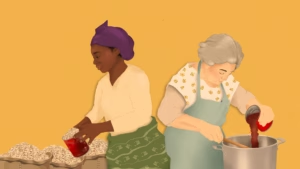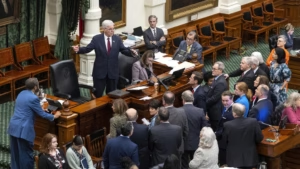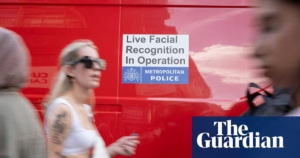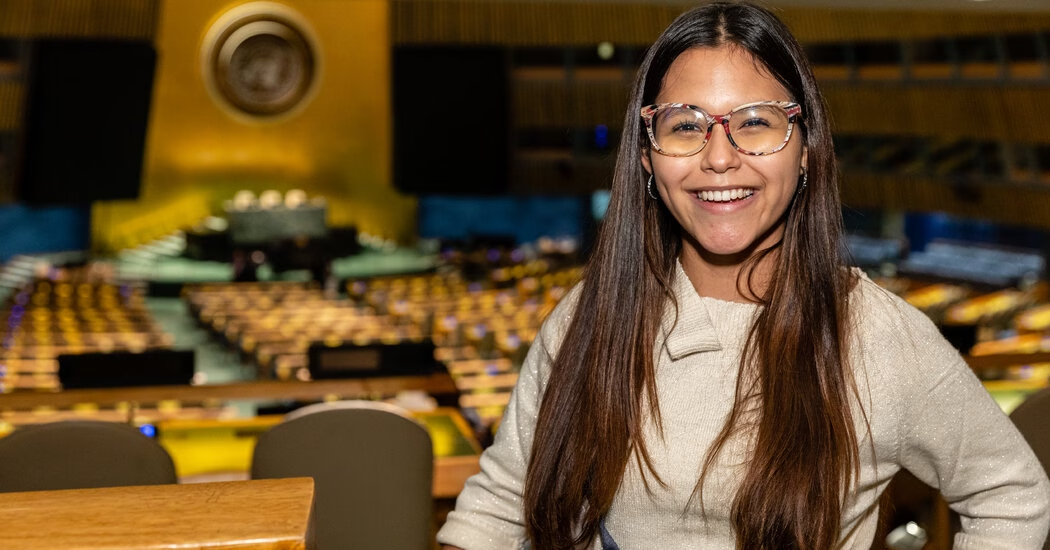This article is from a special Women and Leadership report that highlights women who are breaking new ground and fighting for opportunities for women and other marginalized groups.
Ms. Isidora Uribe Silva first faced prejudice when she was 12 years old.
“Up until that point, having cerebral palsy was never a problem from the perspective of others, but when I changed schools, I was bullied by my classmates,” said Ms. Uribe Silva, who uses a walker or cane. “My teachers and the school wouldn’t accommodate me, and I felt increasingly isolated.”
Ms. Uribe Silva, who was born Isidora Guzmán Silva, left school for seven months until she found Institución Teresiana in Santiago, Chile, which accepted her despite her disability.
“That experience made me deeply aware of the systemic exclusion that exists, not just for myself but for many other marginalized communities worldwide,” said Ms. Uribe Silva, who is now 20 and studying law at the Pontifical Catholic University of Chile. She’s become an advocate for inclusion policies and fights for these changes across Chile and around the globe, especially for women with disabilities like herself.
At 13, she made an app, Encuentra Tu Lugar (Find Your Place), to help Chile’s disabled find accessible parking spots and started a foundation to advance her mission further.
She is a member of the Generation Equality Adolescent Committee of U.N. Women and was selected for the U.N. Women Leaders Network, which advocates for equal leadership and decision-making for women.
Ms. Uribe Silva talked about her experiences via phone and email; these conversations were condensed and edited.
Can you tell me more about the treatment that triggered your advocacy?
The school was only willing to make minimal changes for me to be included. I needed a larger bathroom stall, elevator and ramps, and extra time on tests because writing was difficult for me.
I was kept out of physical education and team sports. There was no option but to leave.
Through Institución Teresiana, I joined Tremendas, a foundation in Chile run by adolescents and women who fight for gender equality. I met significant change agents and noticed the scarcity of women with disabilities in leadership. This pushed me to make moves that would help women like me and promote universal equality.
How does your foundation, Encuentra Tu Lugar, foster inclusion?
Encuentra Tu Lugar was born as an app in 2018 but never launched due to the pandemic.
I chose a different path. Realizing that inclusion needed to be more accessible in everyday life, I created a web platform that gives information about inclusive public spaces, such as schools, cafes, stores, and workplaces. An inclusive space welcomes and accommodates everyone.
But I also knew I had to empower society by building awareness. This expanded Encuentra Tu Lugar’s mission to focus on inclusive education and job opportunities for individuals with disabilities.
I created the idea of Agentes Inclusivos, a group of 50 volunteers in Chile who fight for local inclusion by offering information, resources, and advocacy for change.
Can you share about your role with Pope Francis’ University of Meaning?
In 2024, a group of education experts, including me, collaborated with the pope to create the University of Meaning, a public university in Vatican City aimed at helping young people worldwide find meaning in life.
The Development Bank of Latin America and the Caribbean invited me to the Vatican in May as part of the group to help create the school’s curriculum. I stayed for three days and was asked to speak at the final event about my life experience.
Has your youth helped or hurt your mission?
When I first spoke out, I felt scared because I lacked experience. But I wanted to learn. I realized my youth could be my greatest strength. I could inspire other young folks to step into unconventional spaces and challenge existing norms.
I also faced challenges; sometimes I wasn’t taken seriously enough, ignored for opportunities because of my age, or given minor roles without real change.
How has working with the Generation Equality Adolescent Committee of U.N. Women helped your cause? What have you taken away from this?
Participating in the committee has taught me how our activism can evolve into real policy changes and shown me the power of uniting women around the world to achieve gender equality.
We have together started remarkable projects, such as the Youth Forum at the 66th session of the U.N. Commission on the Status of Women, where we stressed the need for climate justice and for including people with disabilities in climate change mitigation strategies.
We also worked on the Global Adolescent Girl Leadership Town Hall, a U.N. Women initiative to build a safe space where girls from around the world can discuss their experiences and advocate for policies reflecting their realities. This town hall links young activists with global leaders and promotes an intersectional approach to decision-making, addressing issues like gender, education, sexual and reproductive rights, disabilities, and climate change.
Source: https://www.nytimes.com/2025/03/06/world/americas/women-chile-inclusion-disabled.html




